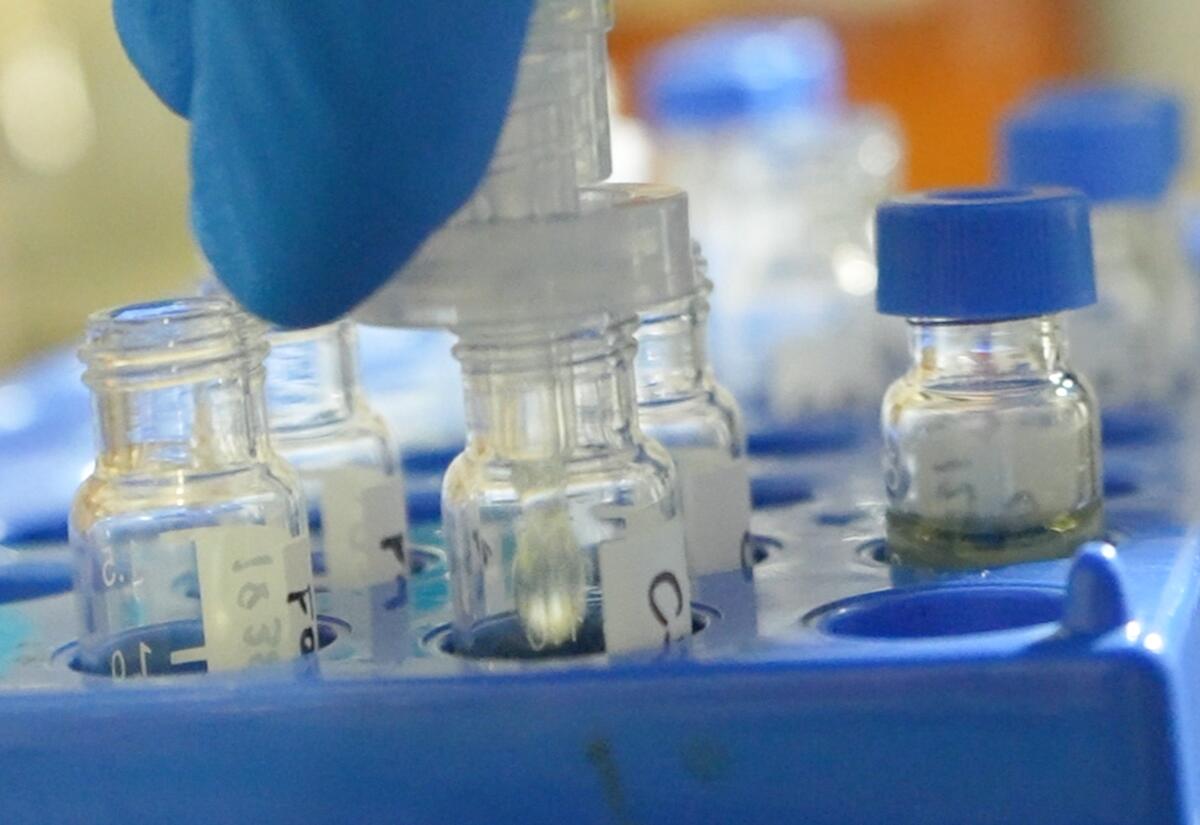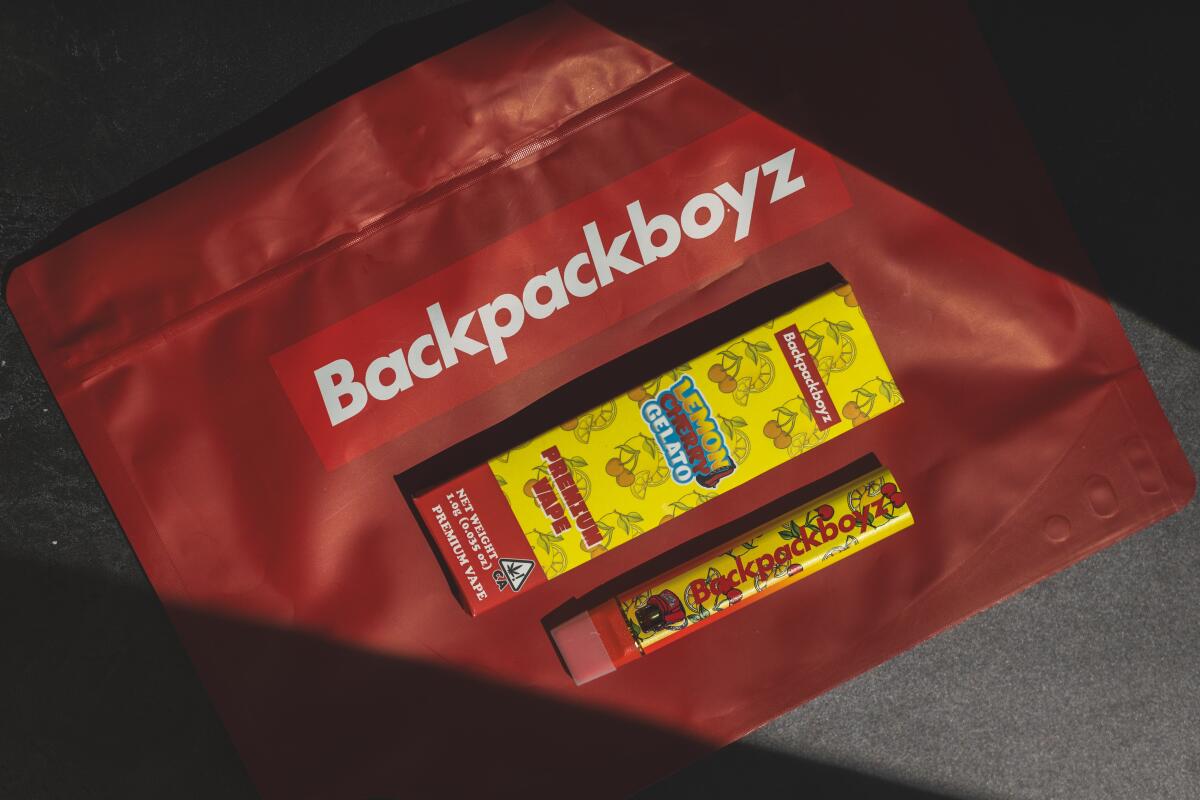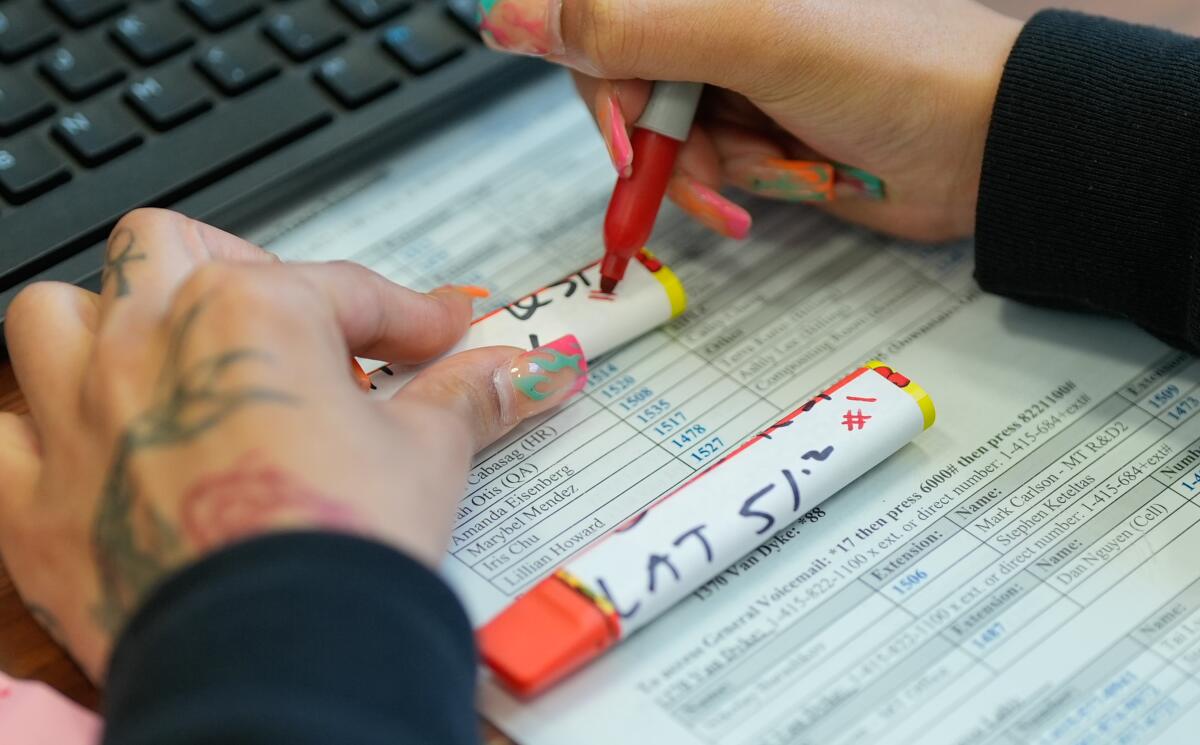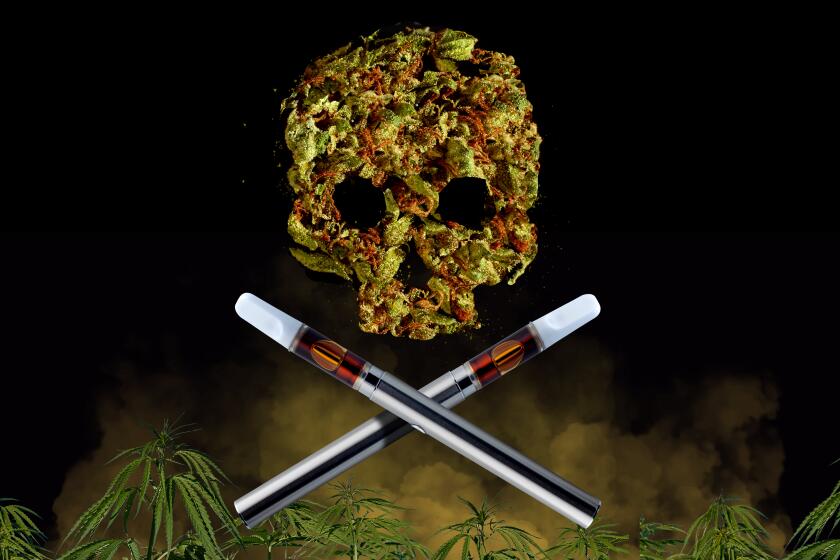Under pressure from weed consumers, California regulators hustle to start testing for pesticides

- Share via
Under intense pressure from millions of weed users, California officials are scrambling to test cannabis products for pesticides following a Times investigation last month revealing that regulators have failed to keep vapes and pre-rolls rife with toxic chemicals out of stores.
The revelation shook consumer confidence in the safety of legal products and panicked industry leaders: Three leading dispensary chains announced their own product testing programs in the absence of similar safety checks by regulators.
The Department of Cannabis Control has publicly proclaimed it was able to check for pesticides in weed products. But the agency acknowledged using other state labs for those tests after The Times learned of the arrangements.
A spokesman for the department contended its claims to be able to test for pesticides included the work of labs at other agencies.
One of the labs is run by the Department of Toxic Substances Control, within the state’s Environmental Protection Agency.
The toxic substances lab, located in Pasadena, was enlisted before it was able to test for most of the chemicals that weed products must be screened for, according to interviews and internal records reviewed by The Times.
Since the Times report, regulators have used those partial and hastily arranged tests to recall nine contaminated products based on the presence of one chemical, despite evidence of much broader contamination and long after most of those products have sold out on store shelves.
The latest recalls in June included three batches of vape cartridges made as long as 10 months ago for the Backpack Boyz brand and for the cannabis delivery service Eaze. Previously, six products made by West Coast Cure, a top-selling brand, were recalled.

Regulators said all of the recalled vapes contained the insecticide chlorfenapyr.
Almost all of the vapes had first been flagged by private labs in complaints to the state about contaminated products. Independent testing by those labs showed the presence of as many as nine other pesticides. Information about the presence of other chemicals would be important to users in evaluating potential harm.
A Los Angeles Times investigation, in conjunction with WeedWeek, finds alarming levels of pesticides in cannabis products at dispensaries across the state.
The disclosure that some top California brands are contaminated hit the state’s legal weed industry like “a bomb,” as one cannabis influencer described the news on social media, while another on TikTok drew more than 4 million views just by reading a partial list of the chemicals documented in The Times’ investigation.
The public reaction escalated pressure on state officials for more aggressive oversight. However, a bill that would attack what its sponsor called “widespread fraud in cannabis testing” had previously been largely gutted of language that would have mandated random safety checks of products taken from store shelves, including tests for levels of toxic chemicals.
A robust shelf-testing program is viewed by its supporters as a crucial backstop to a system that currently relies on private cannabis labs paid by producers to pass or fail their products.
As first introduced in 2023, the bill also would have required the state to test the ability of labs to detect contaminants.
According to the bill sponsor and industry lobbyists involved in negotiations, both safeguards were removed in response to the Department of Cannabis Control, the agency created to protect consumers and ensure California’s legal weed crop is safe and tested — and now under fire for failing to address evidence of contamination in the state’s $5-billion legal weed market. The agency initially would not respond to questions about the bill, saying it “does not comment on pending legislation.”
Subsequently, an agency spokesman said the department was “working collaboratively” with the bill’s legislative sponsor and did not request the bill changes.
The contaminants include chemicals tied to cancer, liver failure, thyroid disease and genetic and neurologic harm to users and unborn children. Most are in concentrations that risk long-term harm by repeated use. But tests show some brands of vapes exceeded state and federal thresholds for harm from a single exposure. The companies behind the brands have denied violating state regulations.
State cannabis officials contend that the agency already has a program in place to test products on dispensary shelves. And the agency said requiring labs to prove their testing abilities would be expensive, though it did not specify how much it would cost. A proficiency testing company told The Times such tests can cost from $500 to $2,000 each, depending on their complexity.
A spokesman for the bill’s sponsor, Reggie Jones-Sawyer (D-Los Angeles) defended scrapping its toughest parts, acknowledging cost concerns raised by the agency were a factor.
“Given the budget constraints this year, the Member has taken this into consideration,” said the spokesman, Richard Garcia.
Jones-Sawyer in late 2023 amended his bill to make product testing optional. Last month, he removed proficiency checks, and cut by half the frequency of proposed lab audits, requiring them once every two years.
Some industry executives say lax oversight, combined with the financial bond between testing labs and their clients, has encouraged shoddy or fraudulent testing and results in contaminated goods being sent to stores.
“We continue to have example after example of the abysmal regulation,” said Jonatan Cvetko, executive director of the United Cannabis Business Assn. “Increasingly, our government continues to give us and the consumers less and less reason to be in the legal market. They must be held accountable for it.”
The problems have long been an open secret, said David Winternheimer, director of the now-shuttered Pacific Star Labs, who said he discussed solutions similar to those in the proposed legislation with top state regulators in 2022. Winternheimer said he was told “you have good ideas to fix this,” but nothing happened. He said Pacific Star Labs, beset by clients blatantly asking for rigged tests and other labs willing to take that business, was unable to compete.
After the Times story, Gov. Gavin Newsom’s office said it would not intervene in the department’s handling of contaminated weed, issuing a statement in support of its ability to address the problem.
“The Governor’s Office supports DCC in developing innovative policies and effective implementation that advances and facilitates a well-regulated, legal, and safe market that benefits all Californians,” wrote Diana Crofts-Pelayo, Newsom’s deputy director of communications. “DCC is best positioned to comment on these efforts.”
The Department of Cannabis Control declined to say how frequently it pulls products from store shelves, including whether it tests them for pesticides.

The state’s ability to monitor pesticide contamination in weed products is limited. Neither a state cannabis control lab in Richmond nor an $11-million contract lab at UC San Diego are accredited for pesticide testing.
Interviews and records reviewed by The Times, including state purchase orders, show cannabis regulators only recently sought to fill that void by using the labs of other state agencies, which themselves are constricted in their abilities.
A state agriculture lab in Sacramento has tested cannabis plant material for pesticides since last spring. In June, the toxic substances lab, set up to analyze toxic waste in soils and water, began pesticide testing on oil-based vapes before being certified to do so.
However, the environmental lab was capable of detecting fewer than half a dozen pesticides, according to the records and interviews. State regulations require legal weed to be tested for 66 chemicals.
A spokeswoman for the Department of Toxic Substances Control this month said the Pasadena lab is expected to conduct cannabis tests for the rest of the year. The lab has assigned one of its scientists to the cannabis work full-time, and plans to add a second. It is working to expand the number of pesticides it can detect in its tests.
It also is developing methods to be used by the cannabis agency’s own lab, “to build out the state’s testing capabilities.”
Those familiar with the cannabis testing, who requested anonymity because they were not authorized to speak to reporters, said cannabis regulators decided that waiting for the lab to be able to test for more pesticides was not necessary because a single pesticide above permitted levels is sufficient to force a product recall.
However, the current narrow testing would miss some contaminated products, and consumers and healthcare providers would remain unaware of other exposures, with potentially enormous health consequences for the estimated 5 million Californians who in any given month consume weed.
The investigation published by The Times in June, in coordination with the industry newsletter WeedWeek, documented contamination in legal weed products that represent some 250,000 cannabis vapes and pre-rolls sold through licensed dispensaries. The reporting found that regulators knew of that contamination since at least October, and had left most of the products to sell out.
From October to April, the state received 85 complaints from two California labs — Infinite Chemical Analysis Labs in San Diego and Anresco Laboratories in San Francisco — documenting contaminants in products. Compliance agents did not visit retail stores to remove many of the products until February.
Samples of those products remained in storage for months, then were sent to the Pasadena lab.
Eaze, a subject of the latest recall, is switching manufacturers for its vape products, said Chief Executive Cory Azzalino. He noted the cannabis retailer relies on the authenticity of lab tests to guarantee the safety of its products, all made by third-party manufacturers.
There was no immediate response to the recall from Backpack Boyz and its distributor. Backpack Boyz’s principal promoter, Juan Quesada, previously alleged contaminated products reported by The Times were “fake vape,” despite being bought at a Backpack Boyz store in Long Beach.
West Coast Cure did not respond directly to The Times after the recall. The company in May was fined $3.2 million for failing to store and prepare cannabis products for testing in a tamper-proof setting.
Co-founder Jerett Wasserman recorded a series of Instagram videos that decried the recalls as retaliation for questioning The Times’ reporting, and suggested the company was the target of “Culture Vulture’s.”
Directors of the private labs said they tried for months to get regulators to address what they saw as persistent problems in the cannabis testing industry, “and the situation only got worse.”
“We went public with our concerns only when all other options were exhausted,” Anresco Laboratories and Infinite Chemical Analysis Labs said in a joint statement earlier this month. “We take no joy in making certain brands or labs look bad, but contaminated products deserve to be recalled and enforcement should be taken.”
Cannabis Control director Nicole Elliott did not respond to requests by The Times for an interview. Multiple industry officials said that for months Elliott has sought to quell their concerns about lab fraud and contaminated products, privately vowing that safety was her top priority.

Last winter, her agency began recalling cannabis products for mold and for inflated potency claims. It shut down one lab and suspended the license of another for improper pesticide testing. Last week, it refused to renew the license of a third lab, citing admissions of fraudulent testing practices made during a February 2022 agency inspection. The testing company, which in the interim changed directors and spent nearly $2 million in equipment upgrades, has filed a legal protest accusing the state of violating due process.
The revelation that regulators failed to keep contaminated cannabis off store shelves triggered sharp criticism of the state agency from trade groups that had previously decried California’s lack of success in curbing unlicensed cannabis operators who out-compete the smaller regulated market.
“The state’s continued failure to enforce against those who fail to comply — both inside and outside of the regulated market — has put the credibility of the entire adult-use market in peril, and now threatens the very consumers we aim to serve,” the California Cannabis Industry Assn. contended.
After The Times’ story, Elliot Lewis, owner of the 28-store Catalyst dispensary chain, broadcast his own shelf testing campaign. To date, Lewis contends no state-licensed cannabis products in his stores have failed these pesticide tests.
The owner of Embarc told The Times it also was including random spot testing of products as part of its retail program in response to both the newspaper’s investigation and increased state product recalls. “We look forward to continued collaboration with good actors across the supply chain,” said CEO Lauren Carpenter, “to ensure trust and transparency with Californians.”
Such private programs are no replacement for statewide regulatory enforcement, those involved said.
“First and foremost, there has to be mandatory confirmatory testing on a random basis,” said Tiffany Devitt, acting as spokesperson for the March & Ash cannabis retail chain.
After the Times report, the company resumed its own random testing of products. Three exceeded state levels for contamination and were pulled from shelves. The brands and regulators were notified.
“There is no other way to pick this stuff up and identify the bad actors.”
More to Read
Sign up for Essential California
The most important California stories and recommendations in your inbox every morning.
You may occasionally receive promotional content from the Los Angeles Times.












